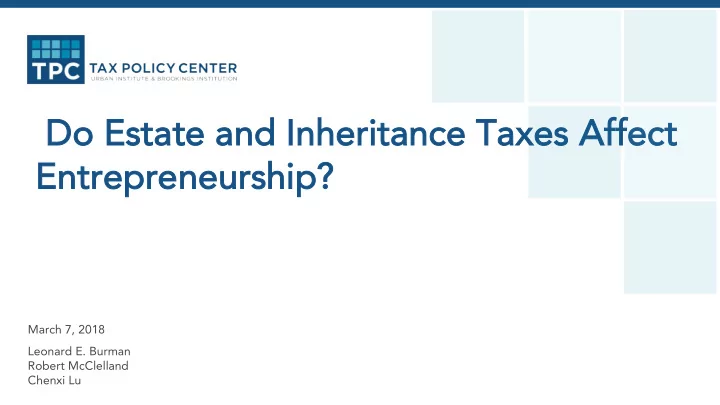

Do Es Estate a and In Inherit itance Taxes Affe ffect En Entrepreneurship ip? March 7, 2018 Leonard E. Burman Robert McClelland Chenxi Lu
Overvi erview ew We examine how changes to wealth transfer taxation affect the likelihood of self-employment among those of retirement age We examine how receipt of an inheritance affects the likelihood of owning and managing a business WWW.TAXPOLICYCENTER.ORG 2
Caveat eats Entrepreneurship involves innovating and taking risks, which are difficult to measure It is unclear whether taxation has larger or smaller effects on entrepreneurs than other business owners Receipt of an inheritance might be correlated with factors such as having parents who are successful entrepreneurs WWW.TAXPOLICYCENTER.ORG 3
Who i is a an E Entrep repren reneur? eur? Schumpeter (1947) “…an innovator who brings together ‘existing productive resources in new ways or for new purposes’ ” Because of data limitations, we use two definitions: self-employment owning and managing a business WWW.TAXPOLICYCENTER.ORG 4
Federal Estate Tax Exemption and Top Tax Rate Exemption level ($ millions) Top rate (%) 12 60 10 50 8 40 6 30 4 20 2 10 0 0 Source : Jacobson, Raub, and Johnson (2007); “Exemption Level, 1999-2015.” Tax Policy Center Statistics, May 31, 2017; and the Form 706 Changes, from “What’s New – Estate and Gift Tax,” Internal Revenue Service, last revised January 12, 2018. Note: In 2010, estate executors could opt out of the estate tax in exchange for taxing some capital gains of heirs. Exemption level for married couples is double that for singles after 2001. WWW.TAXPOLICYCENTER.ORG 5
Less ess T Than 0. han 0.1% 1% o of Dec ecedents ar are Sub e Subject t to Fed Federal Ta Tax We estimate 3,700 estate tax returns for those who die in 2018 Taxable estates may avoid or reduce tax liability via various deductions Special provisions allow valuation discounts for family- owned businesses and farms WWW.TAXPOLICYCENTER.ORG 6
Effect o ect of E Expected ected T Taxable e Estate te on S Self-Employmen yment Entrepreneurs may respond to the estate tax by retiring earlier, or retiring later This only occurs with bequest motive, but evidence is scant Most bequests are accidental Inter vivos transfers are compensatory Bequests tend to be equal, despite different needs Almost 40 percent of decedents die intestate WWW.TAXPOLICYCENTER.ORG 7
Effect o ect of E Expected ected T Taxable e Estate te on S Self-Employmen yment Business owners are more likely to purchase life insurance Wealthy people are the most likely to have a bequest motive People likely to be affected by estate tax do relatively little inter vivos giving WWW.TAXPOLICYCENTER.ORG 8
Effect o ect of E Expected ected T Taxable e Estate te on S Self-Employmen yment Dependent Variables: Self-employment status of respondent Key Independent Variable: Expected taxable estate (including state taxes) Data: Health and Retirement Study, 1994-2014 Method: Fixed Effects, Instrumental Variable Sample size: 26,405 respondents Demographic variables: age, age squared, indicators for wave number Wealth variables: Spline for lagged net worth excluding business wealth Additional control variables: Lagged income WWW.TAXPOLICYCENTER.ORG 9
Effect of Expected Taxable Estate on Self-Employment Self-employment (for all) Self-employment (for the employed) (versus non-self-emp) (versus wage emp) Per million dollars of expected taxable estate 20% 0% -20% -8.3% -7.8% -7.3% -40% -60% -80% -100% -120% All Married Single Has Children No Child Source : Health and Retirement Study, 1994–2014. Note: Results based on our full fixed-effect model with nonbusiness wealth spline control. The vertical bars represent 95 percent confidence intervals of corresponding effects. WWW.TAXPOLICYCENTER.ORG 10
Effects ects of I Inheri heritanc ance e on B Business F ness Formati mation The “Carnegie conjecture”: “the parent who leaves his son enormous wealth generally deadens the talents and energies of the son, and tempts him to lead a less useful and less worthy life than he otherwise would.” Families who receive a large inheritance are more likely to exit the labor force and report less labor income Liquidity constraints are an important factor in starting businesses Inheritances can be used as seed money for new businesses The size of an inheritance substantially affects the likelihood of starting a business WWW.TAXPOLICYCENTER.ORG 11
Effects ects of I Inheri heritanc ance e on B Business F ness Formati mation Dependent Variable: Head of household owns and actively manages a business Key Independent Variables: Receipt of an inheritance in the past 20 years and all inheritances received in the prior 20 years Data: Survey of Consumer Finances, 1992-2010 Method: Weighted Probit Sample size: 30,510 households Demographic Variables: age, age squared, indicator variables for sex, marital status, educational level Wealth Variables: Spline for net worth, spline for net worth excluding business wealth Year: Indicator variable for year WWW.TAXPOLICYCENTER.ORG 12
Effects ects of I Inheri heritanc ance e on B Business F ness Formati mation Size of inheritance ($ millions) Receiving inheritance Per million dollars of inheritance From receiving an inheritance 2.0% 20% 12.8% 12. 8% 1.5% 15% 1. 1.1% 1% 1.0% 10% 0.5% 5% 0.0% 0% Demographics Demographics plus wealth Demographics Demographics plus nonbusiness plus nonbusiness wealth wealth plus year dummies Source : Survey of Consumer Finances, 1992–2010. Note: The vertical bars represent 95 percent confidence intervals of corresponding effects. WWW.TAXPOLICYCENTER.ORG 13
Concl clusi usions The likelihood of self-employment falls by about eight percentage points for every million dollars of taxable estate Self-employed choose between working and retiring rather than between self-employment and wage employment Beneficiaries of bequests are almost 13 percentage points more likely to own and manage a business. Every $1 million of inheritance raises the probability by about one percentage point WWW.TAXPOLICYCENTER.ORG 14
Recommend
More recommend